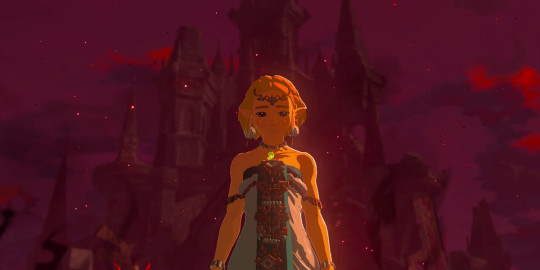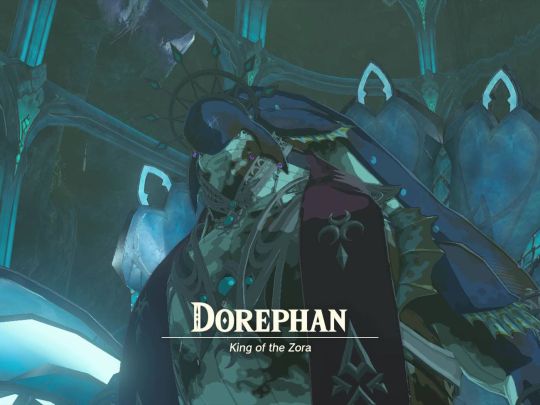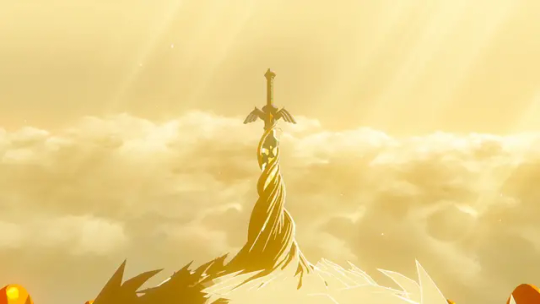#(not saying totk is but it is well known that fun is not a neutral feeling)
Explore tagged Tumblr posts
Text
Hello!! I'm back for: more whining about TotK Quest Design Philosophy
I can't reblog a really great post I just saw for some reason (tumblrrrr *shakes my fist*), but hmmmm yeah not only do I completely agree, but I think I might expand on why I feel so much annoyance towards TotK's quest design philosophy at some point, because it does extend past the fundamentally broken setup of trying to punch a pseudo-mystery game on top of BotW's bones, where the core objective was always explicit and centered and stapled the entire world together; or the convoluted and inefficient way it tells its story through the Tears, the somehow single linear exploration-driven quest in the entire game.
Basically: I'm talking about the pointless back-and-forths. There were a lot of them, a lot that acted against the open world philosophy, and almost none of them ever recontextualized the environment through neither gameplay abilities nor worldbuilding nor character work.
I'll take two examples: the initial run to Hyrule Castle (before you get your paraglider), and then the billion back-and-forths in the Zora questline.

I think?? the goal of that initial quest to Hyrule Castle is to familiarize you with the landmark, introduce the notion that weapons rot, tell you about the gloom pits, and also tell you that Zelda sightings are a thing? But to force any of these ideas on you before giving you a paraglider is, in my opinion, pretty unnecessary. I think the reason it happens in that order is to prevent Link from simply pummeling down to the gloom pit under Hyrule Castle and fight Ganondorf immediately while still introducing ideas surrounding the location; but genuinely, the Zelda sighting makes the next events even more confusing? Why wouldn't you focus all your priorities in reaching the castle if you just saw her there? Why lose time investigating anything else? Genuinely: what is stopping you from getting your paraglider and immediately getting yourself back there, plunging into the depths to try and get to the literal bottom of this? (beyond player literacy assuming this is where the final boss would be, and so not to immediately spoil yourself --which, in an open world game, you should never be able to spoil yourself by engaging with the mechanics normally, and if you can that's a genuine failure of design)
I think, personally, that you should not have been pointed to go there at all. That anything it brings to the table, you could have learned more organically by investigating yourself, or by exploring in that direction on your own accord --or, maybe you think Zelda is up there in the castle, and then the region objectives become explicitely about helping you reaching that castle (maybe by building up troops to help you in a big assault, or through the Sages granting you abilities to move past level-design oriented hurdles in your way, etc). Either way: no need to actually make you walk the distance and back, because the tediousness doesn't teach you anything you haven't already learned about traversal in the (extremely long, btw, needlessly so I would say) tutorial area.

But to take another example, I'll nitpick at a very specific moment in the Zora Questline, that is honestly full of these back-and-forth paddings that recontextualize absolutely nothing and teach you nothing you didn't already know. The most egregious example, in my opinion, is the moment where you are trying to find the king, and you have to learn by listening in to the zora children who do not let you listening in.
So okay. I think Zelda is great when it does whimsy, and children doing children things guiding you is a staple of the series, and a great one at that. But here? It does not work for me on any level. Any tension that could arise from the situation flattens because nobody seems to care enough about their king disappearing in the middle of a major ecological crisis, except for children who are conveniently dumb enough not to graps the severity of the situation, but not stressed out enough that it could be construed as a way for them to cope about it and make anything feel more serious or pressing. It feels like a completely arbitrary blocker that isn't informed by the state of the world, doesn't do anything interesting gameplay-wise with this idea, doesn't build up the mood, and genuinely feels like busywork for its own sake.
This is especially tragic when the inherent concept of "the zora king has been wounded by what most zoras would believe to be Zelda and is hiding from his own people so the two factions do not go to war over it" has such tension and interest and spark that the game absolutely refuse to explore --instead having you collect carved stones who do not tell you anything new, splatter water in a floating island, thrud through mud who feel more like an inconvenience than a threat or, hey, listen to children playing about their missing king less than a couple of years after being freed from Calamity Ganon's menace. It feels like level designers/system designers having vague technical systems that are hard-coded in the game now, and we need to put them to use even if it's not that interesting, not that fun or not that compelling. It's the sort of attitude that a lot of western RPGs get eviscerated for; but here, for some reason, it's just a case of "gameplay before story", instead of, quite simply, a case of poorly thought-out gameplay.
Not every quest in the game is like this! I think the tone worked much better in the sidequests overall, that are self-contained and disconnected from the extremely messy main storyline, and so can tell a compelling little tale from start to finish without the budget to make you waddle in a puddle of nothing for hours at a time. It's the only place where you actually get character arcs that are allowed to feel anything that isn't a variation on "very determined" or "curious about the zonai/ruins", and where you get to feel life as it tries to blossom back into a new tomorrow for Hyrule.
But if I'm this harsh about the main storyline, it really is because I find it hard to accept that we do not criticize a structure that is at times so half-assed that you can almost taste employees' burnout seeping through the cracks --the lack of thematic ambition and self-reflection and ingeniosity outside of system design and, arguably at times, level design-- simply because it's Hyrule and we're happy to be there.

There's something in the industry that is called the "wow effect", which is their way to say "cool" without saying "cool". It's basically the money shots, but for games: it's what makes you go "ohhhh" when you play. And it's great! The ascension to the top of the Ark was one of them --breathtaking, just an absolute high point of systems working together to weave an epic tale. You plummeting from the skies to the absolute depths of hell is another one; most of the dungeons rely on that factor to keep your attention; the entire Zelda is a dragon storyline is nothing but "wow effect" (and yeah, the moment where you do remove the Master Sword did give me shivers, I'll admit to this willingly) and so is Ganondorf's presence and presentation in the game --he's here to be cool, non-specifically mean, hateable in a non-threatening way and to give us a good sexy time, do not think about it too hard. What bothers me is that TotK's world has basically nothing to offer but "wow effect"; that if you bother to dig at anything it presents you for more than a second, everything crumbles into incoherence --not only in story, but in mood, in themes, in identity. This is a wonderfully fun game with absolutely nothing to say, relying on the cultural osmosis and aura of excellency surrounding Zelda to pass itself off as meatier than it really is. This is what I say when I criticize it as self-referential to a fault; half of the story makes no sense if this is your first Zelda game, and what little of that world there is tends to be deeply unconcerned and uncurious about itself.
And no, Breath of the Wild wasn't like this. Breath of the Wild was deeply curious about itself; the entire game was built off curiosity and discovery, experimentation and challenge (and I say this while fully admitting I had more fun with the loop of TotK, which I found more forgiving overall). The traversal in Tears of the Kingdom is centered around: how do I skip those large expanses of land in the most efficient and fun way possible. How do I automate these fights. How do I find resources to automate both traversal and fights better. It's a game that asks questions (who are the zonais, who is Rauru and what is his deal, what is the Imprisoning War about, where is Zelda), and then kind of doesn't really care about the answers (yeah the zonais are like... guys, they did a cool kingdom, Rauru used to run it, the Imprisoning War is literally whatever all you have to care about is who to feel sad for and who to kill about it and you don't get a choice and certainly cannot feel any ambiguous feelings about any of that, and Zelda is a dragon but we will never expand on how it felt for her to make such a drastic and violent choice and also nobody cares that's a plot point you could *remove* from the game without changing the golden path at all).
I'm so aggravated by the argument "in Zelda, it's gameplay before story" because gameplay is story. That's the literal point of my work as a narrative designer: trying to breach the impossibly large gap between what the game designers want to do, and what the writers are thinking the game will be about (it's never the same game). And in TotK, the game systems are all about automation and fusion. It's about practicality and efficiency. It's also about disconnecting stuff from their original purpose as you optimize yourself out of danger, fear, or curiosity --except for the way you can become even more efficient. And sure, BotW was about this too; but you were rewarded because you had explored the world in the first place, experimented enough, put yourself in danger, went to find out the story of who you used to be and why you should care about Hyrule. I'm not here to argue BotW was a well-written game; I think it was pretty tropey at large to be honest, safe for a couple of moments of brilliance, but it had a coherent design vision that rewarded your curiosity while never getting in the way of the clarity of your objective. There is a convolutedness to TotK that, to me, reveals some extremely deep-seated issues with the direction the series is heading towards; one that, at its core, cares more about looking the part of a Zelda game than having any deeper conversation about what a Zelda game should be.
#thoughts#tloz#totk#totk critical#when will my brain return from the imprisoning war...#quest design#game design#level design#game criticisim#I think the more time goes on and the more uncomfortable I am with “if the game is fun it's good”#sometimes the game is fun and the game is empty#fun games can be addictive and predatory on purpose#(not saying totk is but it is well known that fun is not a neutral feeling)#fun can also reinforce questionable ideas of what “fun” should even look like#*side-eying CoD and co*#and fun =/= coherent always#if we're talking about games like artpieces#then you don't get to pick and choose which parts matter and which parts don't#you can absolutely say “I resonated with it for X and Y” but to make an argument that people who feel uncomfortable by content#that is in the game!! put in the game!! on purpose!!#is not a very productive attitude let's say
173 notes
·
View notes
Note
Ahhhhh, a case of tumblr's "how dare you say we piss on the poor" reading comprehension, once again found in the wild. I don't think I've ever seen you call Ganondorf a good guy, or misunderstood. From what I've seen you, and anons, say you'd wish there had just been more depth to him. Very different than "secretly misunderstood uwu baby" not like him having an actual personality and story would have negated him being a horrible person. A character born from misunderstanding and hardship, can still turn into an unquestionable monster and villain.
Oh well, I mean the thing is, it's the kind of position that it's hard to argue with once you already made your point. Not everybody just... has the tools to understand the actual argument too, which I mean, it's why I think it's important to talk about themes and cultural shortcuts and the history of tropes on top of the general history, because in many cases it needs to be actively sought for.
And yes, I think what bugs me with this whole thing is... Like, wouldn't it make for a better story? Just, pushing all of the more sensitive reasoning of representation to the side (even though it's not neutral to constantly demonize men of color or render them lovingly stupid, which does remain a pattern in the series), wouldn't the story gain more momentum and investment if the bad guy had compelling motivations that made sense (and I'm not even saying they have to go all poor little meow meow, they could just be: why is Power a good thing for him)? I honestly don't see what it would remove, I only see advantages to making Ganondorf slightly more complex, and I don't really understand the opposition to that. Are you guys like... okay with the most generic anime man motivations known to mankind spurred out of his mouth in a way that is basically completely indistinct from any other generic baddie out there? Like is this peak quality? Can't we be like "Nintendo, your game is great, but you kind of cheesed this thing a lot of people expected you to handle better and with more thoughtfulness, like I'm not sure I would have been able to tell if you had gotten Chat GPT to write this instead of an actual person, and your unwillingness to take narrative risks is getting a little concerning. TotK is a very fun game, but maybe reinvest in the narrative department next time because it was not the best you could do and you probably know this"
And like... for this to be a normal and reasonable opinion to have and share?
I don't know, the defensive atttitude about Nintendo when their games are faced with extremely mild complaints all things considered is just an extremely puzzling phenomenon to me.
#asks#thoughts#ganondorf#totk#totk critical#when will my brain return from the imprisoning war...#thanks for the ask!#I mean it was short-lived and people are entitled to their opinion#but well so am I I suppose?#(again... still weirded out that no writers were credited in the end credits)#(or maybe I missed them but I was searching for them to get a sense of size)#((and a sense of turnaround also like is this reasonable for X persons to have written this game in 6 years and if not where are the rest))#((credits in the videogame industry is BAD bad bad and knowing in which ways can tell you a lot about a production))#((but here they're just???? not present??))
36 notes
·
View notes